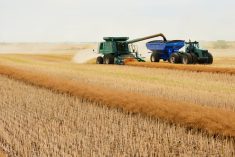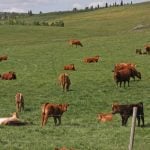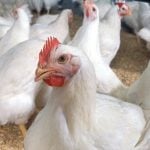An expert panel convened by the Council of Canadian Academies is urging more research into the potential impact of climate change on water available for agriculture.
In a newly released report commissioned by Agriculture and Agri-Food Canada, the panel concludes that water and land resources in Canada can be more sustainably managed by developing forward-thinking policies and effective land and water management strategies, adopting effective governance mechanisms and harnessing technological advancements.
"Agriculture and water provide us with our most basic needs, and are intimately connected," Howard Wheater, director of the Global Institute for Water Security at the University of Saskatchewan, and chair of the council’s expert panel, said in a release.
Read Also

Australia’s weather bureau casts doubt on prospects for La Nina
Australia’s weather bureau is not convinced that a La Nina weather pattern is forming that could change rainfall patterns and bring wilder weather to parts of the Americas, Asia and Oceania, affecting crop production.
"While most farmers are their own water managers, using rain and snow for crop production, irrigation and livestock farming are major water consumers and face increasing competition from other water uses.
"Agriculture has changed much of our land area and can affect the water environment in many ways. It also faces major challenges due to the uncertain impact of climate variability, including floods and droughts, and climate change."
As the world’s population grows, so does the demand for food. Rising incomes are causing a shift in global patterns of food consumption towards higher-value forms of agricultural production. There is also increased demand for non-food agricultural products such as biofuels and natural fibres.
The report lays out five areas in which it sees a need for additional research and action on the part of governments:
- risks and uncertainties of market conditions, competition for land and water resources, and climate change;
- improved monitoring, modelling and forecasting to facilitate adaptive management;
- interaction between land management and water resources — including assessment of beneficial management practices (BMPs), conservation agriculture and ecosystem services approaches;
- promising farm-scale technologies that could contribute to efficient water use, reduced environmental impacts and sound investment decisions; and
- governance structures, valuation techniques, economic incentives and knowledge transfer strategies that would help to facilitate better management decisions and uptake of sustainable practices.
Operating since 2005 and based in Ottawa, the Council of Canadian Academies is a not-for-profit organization supporting "science-based expert assessments to inform public policy development in Canada."
Council-backed assessments are conducted by independent, multidisciplinary panels of experts from across Canada and abroad. The council’s member academies include the Royal Society of Canada, the Canadian Academy of Engineering and the Canadian Academy of Health Sciences.
Related stories:
New fishery laws to exempt irrigation, field drainage, April 25, 2012
B.C. curbs irrigation from river, Sept. 19, 2009
Report urges major expansion in Sask. irrigation, Dec. 4, 2008
















